- Home
- Brian Falkner
Clash of Empires Page 2
Clash of Empires Read online
Page 2
“I did,” Frost says. “But do not let me interrupt your training session.” He turns to the subaltern and dismisses him with a quiet word.
Willem turns back to the line of soldiers.
McConnell is bragging about his fighting skills. He was born with a sword in his hand, it would seem. He demonstrates with cuts and thrusts and appears, to Willem’s eye, genuinely talented, although the other lieutenants conceal their disdain behind fixed expressions.
“Gentlemen,” Willem says, recapturing their attention. “Take a break. Go and select a trojansaur. Join me on the parade ground in an hour.”
McConnell sheathes his sword and all six lieutenants stand to attention and salute before making their way from the courtyard.
“You have become quite the dashing young major,” Frost says when they are out of earshot.
“An illusion,” Willem says. “Smoke and mirrors, nothing more.”
“So what do you really think of your new saur-killers?” Frost asks.
“Do you inquire as a friend or as an officer of the Intelligence Service?” Willem asks.
“Does it matter?”
Willem shrugs. “I think they are well equipped for an attack by an army of herbisaurs.”
“And battlesaurs?” Frost wonders.
“There is only one way to find out,” Willem says. There is more that he could say, but he doesn’t. Not even to Frost.
“Hew McConnell?” Frost asks. “Is he ready?”
Willem is amazed at how little escapes Frost’s notice, even without eyes.
“He is the one who worries me most,” Willem says. “He is a braggart, and I think of very little substance.”
“He may surprise you,” Frost says. “My father knows his father. We spent time together as children.”
“I apologize,” Willem says quickly. “I did not realize he was your friend. I meant no offense.”
“None was taken, and I do not count him as a friend. Far from it,” Frost says. “We were ill-suited to each other’s temperaments. But I know this: Hew has lived all his life in the shadow of a great man, his father. Even as a child he was constantly trying to prove himself worthy. Perhaps he will. He comes from good stock.”
“I hope you are right,” Willem says. “Come, let us warm up for a moment in the officers’ mess.”
He takes his friend by the arm and leads him toward the main entrance of the barracks.
“I have heard many stories about you,” Frost says. “You have achieved a certain infamy on the other side of the English Channel.”
“What kind of infamy?” Willem asks.
“They call you the Wizard of Gaillemarde,” Frost says. “Napoléon’s soldiers fear you. They say you are no conjurer but a sorcerer, capable of true magic.”
“Let them think that,” Willem says. “Perhaps it will work to our advantage.”
“Napoléon of course spreads word that it is not true,” Frost says. “That you are just a boy with a box of conjuring tricks. But his soldiers believe that you can turn yourself into a dinosaur, that you can control the weather, that you can disappear from one place and reappear in another.”
“If that were so, this war would already be won,” Willem laughs. “I would turn myself into a battlesaur and appear in Napoléon’s quarters during a thunderstorm.”
He mimes picking meat from between his teeth.
“If only this were true,” Frost says.
“But we will have to make do with my ‘simple conjuring tricks’ when we reach the forest,” Willem says.
“When do you leave?” Frost asks.
“Today is the last day of training,” Willem replies cautiously.
Frost stops in his tracks. “Do you not trust me?” he asks.
“Of course,” Willem says, encouraging Frost forward with a gentle tug on his sleeve. “Again I owe you an apology. You are perhaps the one person in this country whom I do fully trust. We sail in seven days.”
“How many men?” Frost asks.
“Just six,” Willem says.
“Six?”
“Six trained saur-killers.” Willem smiles to cover his own anxiety. “Along with the two hundred infantry who will overwhelm the abbey and allow us to slay the battlesaurs in the cavern below.”
“You will emerge through the cave?” Frost asks.
Willem nods. “Right in the heart of the abbey while the French are occupied with the threat from without.”
Frost nods. “The journey to the Sonian will not be easy.”
“We go by night,” Willem says. “The Royal Navy will create a diversion near Zeebrugge while we slip quietly down the Oosterschelde.”
“Surely there are lookouts,” Frost says. “Even at night they will see you and raise the alarm.”
“You no doubt remember Sofie and Lars, who helped us escape from Antwerp?” Willem asks.
“I did not meet Sofie,” Frost says. “But Lars would be hard to forget.”
Willem smiles. Lars is a giant of a man.
“I have sent word to her and received a reply,” Willem says. “The lookouts along the Oosterschelde will be looking the other way, or sleeping. Those who can be bribed, will be bribed. The others will be dealt with. Sofie has many friends in that part of the Netherlands.”
“And after you land?” Frost asks.
“Lars will meet us in Krabbendijke,” Willem says. “And guide us past any French encampments.”
Frost frowns.
“You seem concerned,” Willem says. “Is there something I should know?”
“I did not say anything,” Frost says.
“And yet you are holding something back,” Willem says. “Is it about Héloïse? What have you learned?”
Héloïse, the wild girl, who lived for many years in the Sonian Forest outside Willem’s village after her mother was taken by a firebird. She was one of the few survivors of the massacre at Gaillemarde. She had helped Willem, Frost, and Jack Sullivan escape from Europe, traveling with them through the sewers of Antwerp and sailing out of the harbor under the nose of Napoléon himself.
Within a week of her arrival in England, Héloïse had bitten a British officer and was taken to the St. Luke’s Hospital for Lunatics despite the loud protestations of Willem and Frost. She escaped twice in the first week, was recaptured both times, then disappeared altogether.
“Is Jack here?” Frost asks. “I should like to see him.”
Now it is Willem who stops walking, which stops Frost as well. He looks at Frost for a moment, trying to read his expression.
“The officers’ mess can wait,” he says. “Jack builds and maintains the trojansaurs.”
“Really?” Frost says.
“But you already knew that,” Willem says. “As I think you already knew the details of our mission. Come, let us go find him.”
Frost manages to look suitably offended as Willem takes him by the arm and leads him toward the workshops.
CAPTIVITY
The abbey is old. Older than Cosette can comprehend. She cannot look at the crumbling walls without thinking of those who built this place so very long ago. It is older than the church in Waterloo or the ancient saur-wall at Brussels. She thinks the world must have been young when men carved out this clearing in the dense Sonian Forest and quarried stone to build the high walls and even higher bell tower.
Who were they? Why did they come here to build a place of worship in such isolation? And why did they build the abbey over the entrance to a vast underground cave? Was it as an escape route if the abbey came under attack?
Napoléon’s men have enlarged the opening to the cave, walled it off, and fitted it with great wooden doors. She keeps well away from that part of the abbey. She knows what lies beneath.
A few weeks earlier Cosette and Madame Verheyen—Willem’s mother—had been confined to their cell with no reason given. They cowered and held each other as the floor and even the thick stone walls trembled. The light from the high stone window had dimmed a
s something vast passed by. Then another. And another. She could not see them, but in her mind’s eye she had clearly pictured the malevolent eyes, cold steam breath, and huge, jagged teeth of the terrible thing that had lunged at her that night in the village.
Now she hurries through the courtyard with breakfast: a bowl of rice gruel to share with Marie Verheyen in the church that is the base of the bell tower. They spend most of their day there. Their cell is too small, merely a square room with two sackcloth beds and a pail for toileting. After a few weeks of imprisonment Marie negotiated with Baston to allow them to use the church. The French soldiers do not use it, except on Sundays for mass.
A soldier is tending one of the vegetable patches that take up most of the courtyard. Private Deloque, a brute of a man with a brute of a beard who seldom speaks except for grunts and lewd remarks when she passes. He is turning earth with a hoe, mixing in manure. It smells like dinosaur dung.
He steps out of the garden as she approaches, blocking her path. She steps to the side but he moves in the same direction and when she steps back, he steps back also. He grins, a gap-toothed smile, and grunts unintelligibly.
“Excuse me, sir, I would pass,” Cosette says.
Deloque grunts again.
Cosette makes to step to the left, but changes direction quickly to the right, stepping nimbly around Deloque. He thrusts out the hoe as she passes, however, catching her foot, and she falls, sprawling into the vegetable patch.
“What is going on here?” A voice comes from over her right shoulder. Cosette sits up, covered in mud, manure, and gruel, to see Belette, a lumpy-looking sergeant, emerging from a doorway.
“Merely an accident, monsieur,” Cosette says. “I tripped.”
Belette steps swiftly forward and extends a hand to help her up.
“Thank you, monsieur,” Cosette says with a small smile.
Belette has always been pleasant to her, finding her extra rations or treats such as a piece of soft cloth for her bath.
“Private Deloque, back to work,” Belette says.
Deloque glowers but steps back into the garden and resumes his hoeing. Belette picks up the empty gruel bowl.
“Your breakfast?” he asks.
Cosette nods.
“Here,” Belette says, holding out a cloth. It is knotted at the top and filled with something. It smells like bread. “Something fresh for breakfast for you and your mother,” he says. “And some butter as well.”
Marie Verheyen is not her mother, but it was a necessary subterfuge that they have maintained. The soldiers’ belief that she is Willem’s sister is what has kept her alive.
“That is very kind, monsieur,” Cosette says cautiously.
“I have no doubt that your stay is arduous enough,” Belette says. “I am happy to do what I can to ease the passing of the days.”
“I am indebted to you, monsieur,” Cosette says. She takes the cloth-wrapped bundle.
Belette falls in step alongside Cosette as she continues to the church. “Allow me to escort you,” he says. “With both General Thibault and Captain Baston away, I fear the discipline of some of the men is not what it should be.”
“It was merely an accident, monsieur,” Cosette says.
“But of course,” Belette says.
The entrance to the church is a large pointed archway. Belette leaves her there with a smile and a small bow.
Inside, the seats are wooden and new, replaced by the French, although the altar is made of stone and as old as the church itself.
Marie is waiting there. She looks up, her nose twitching as Cosette enters. “What happened?” she asks.
“An accident in the garden,” Cosette says. “Courtesy of Private Deloque.” She grimaces. “I smell like the back end of one of their fiendish saurs.”
Marie uses a foul word to describe Deloque.
“But now we have fresh bread and butter,” Cosette says. “Courtesy of Sergeant Lumpy.”
Marie laughs. “Belette is an odd-looking man.”
“He has a kind heart,” Cosette says.
She sets the cloth down on the pew next to Marie and wipes her hands as best as she can on her dress.
“Now your dress smells as bad as you do,” Marie says.
“I will go to the rock pool to bathe after breakfast,” Cosette says. “I will wash the dress then also.”
“I will go after you return,” Marie says, and Cosette nods.
Only one of them is allowed to leave the abbey at a time.
Cosette sits and they break the bread together. Marie sniffs at it.
“It is not fresh,” she says. “In fact, I would barely call it bread.”
“But still better than the rest of the slop they call food,” Cosette says.
“Sadly true,” Marie says.
“Deloque grows more impertinent by the day,” Cosette says. “Belette says we must take extra care now that Thibault and Baston are away.”
“Belette is right,” Marie says. “These are foul, brutal men. We have been lucky so far. The soldiers fear Thibault and respect Baston but with them both gone I fear for our safety. Horloge is a milksop.”
Captain Horloge is in charge in Baston’s absence. He is a small man, no older than eighteen and still struggling to grow more than a short fuzz on his upper lip.
Marie breaks off a crust and dabs it at the butter, then chews it slowly. “When we first came here, what did I tell you?”
“To survive,” Cosette says.
“Whatever it takes,” Marie says. “Your honor and your virtue are precious, but not as valuable as your life. This ordeal will end. Do whatever you have to do to survive.”
“How is Monsieur Verheyen?” Cosette asks, uncomfortable with this line of conversation. Back in the village of Gaillemarde, her sister, Angélique, had done what was necessary to survive and had ended up as a meal for a monster.
Marie does not answer, but stares at Cosette until the girl nods.
“I will do whatever it takes,” Cosette says. “How is your husband?”
Maarten Verheyen had been thought long dead, until they had discovered him incarcerated here in the abbey.
“I fear for him,” Marie says. “He grows weak. He has been a prisoner here too long, without proper food or fresh air. We all have.”
THE TROJANSAURS
Jack is up a ladder working on Harry’s face when the lieutenants arrive. Some have blood spatter on their uniforms. Most look a little shocked, although one or two seem exhilarated. He knows this look. They have just killed herbisaurs. For most of them this was their first kill of any kind. Not for the tall Irishman, Big Joe Hoyes, though, Jack knows. He has seen much worse on the battlefield.
Jack ignores them and concentrates on his work.
The trojansaurs are lined up outside the carpentry workshop, in the open air. Jack would like to see them inside, out of the elements, but they are too large to fit through the workshop doors.
There are six trojansaurs altogether, named after the legendary wooden saur of Troy. The upper body of a dinosaur mounted on a gun carriage. A practice dummy. When the trail of the gun carriage is resting on the ground and the dinosaur head raised into the air, each is twice the height of a man. That is where Jack is now. He set the ladder carefully and checked it three times for stability before daring to climb it. He focuses on the face so he won’t look down. He does not like to look down.
The faces are nightmarish, bony-ridged brows over eyes foiled with silver. They reflect even the dull light of the overcast London sky. The nostrils are deep-set and keyhole-shaped. The “skin” is painted with intricate scales. The jaws are open, and white-painted wooden teeth gleam with menace. Each head has taken Jack more than a week to carve and paint in painstaking detail, using skills he learned from his father.
He has styled them after the six men on his gun crew, lost at Waterloo: Harry, Sam, Douglas, Dylan, Ben, Lewis. In his carvings he has tried to capture something of each person: Dylan’s narrow-set eye
s, Ben’s single thick eyebrow, Harry’s wide smile.
He misses the lads. They always treated him well. They were like brothers. Here he has no brothers and few he could count as friends. Like other survivors of the battle at Waterloo, he is not regarded as a hero. Far from it.
He marks cuts with a stick of chalk, then holds the chalk with his mouth and takes a chisel and mallet from his belt.
The lieutenants wander along the line of trojansaurs as Jack chips carefully away at the corner of Harry’s smile.
The Scotsman, McConnell, stops next to Jack’s ladder.
“I’ll take this,” he says.
“Harry’s not quite ready, sir,” Jack mumbles through the piece of chalk in his mouth.
“Harry’s not quite ready, sir.” McConnell mimics Jack, and laughs. “They have names.”
“Yes, sir,” Jack says. “After me friends. Who died at Waterloo, sir.”
“Yes, Waterloo,” McConnell says. He takes hold of the ladder with both hands. “This ladder doesn’t look stable to me. Is it safe?”
“Yes, sir, I hope so, sir,” Jack says, not daring to look down at him.
“Let me check,” McConnell says. He shakes the ladder, grinning around at the others as he does so. Jack’s chisel slips and adds a cruel gash to the corner of the wooden lip. He grabs for the huge, carved wooden teeth of the trojansaur. The chisel clatters off the cobblestones below him, landing at McConnell’s feet. Jack had not even realized that he had dropped it.
“Are you afraid, Sullivan?” McConnell laughs. “Like you were afraid at Waterloo?”
Jack says nothing. It is true. He was terrified at Waterloo.
McConnell rattles the ladder again. Jack clings on desperately.
“Well, Sullivan?”
“Sir, yes, sir. I’m a bit afraid of heights,” Jack manages.
“Will you run away?” McConnell asks. “As you ran at Waterloo, leaving your friends behind?”
“I didn’t run, sir,” Jack says.
“I think you did, Sullivan,” McConnell says, shaking the ladder again. “And that’s why you lived and they all died.”
Jack loses one foot from the ladder rungs and frantically scrabbles to find it. He cries out in fear and indignation. “That ain’t what happened, sir!”

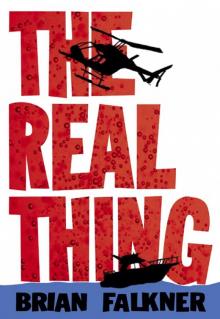 The Real Thing
The Real Thing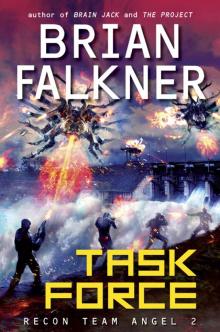 Task Force
Task Force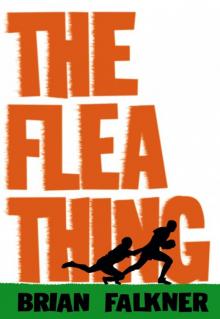 The Flea Thing
The Flea Thing The Project
The Project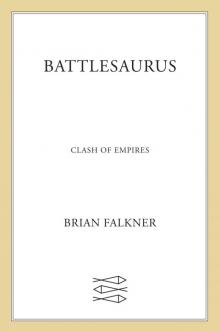 Clash of Empires
Clash of Empires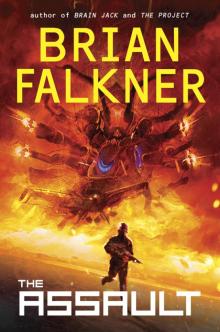 The Assault
The Assault Brain Jack
Brain Jack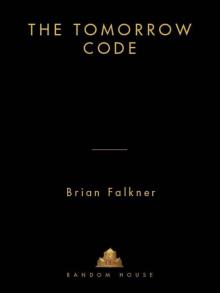 The Tomorrow Code
The Tomorrow Code Vengeance
Vengeance The Super Freak
The Super Freak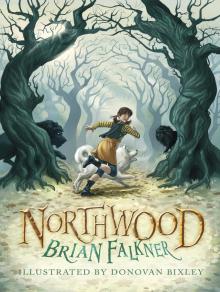 Northwood
Northwood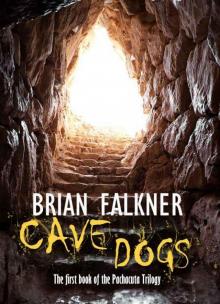 Cave Dogs (Pachacuta Book 1)
Cave Dogs (Pachacuta Book 1)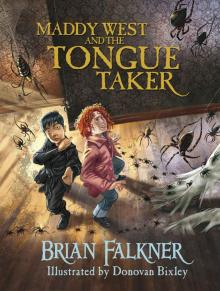 Maddy West and the Tongue Taker
Maddy West and the Tongue Taker